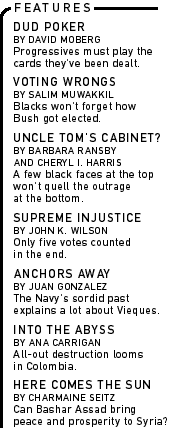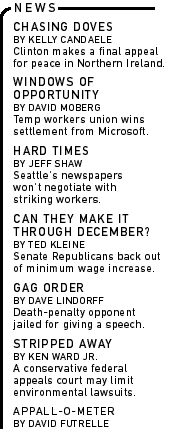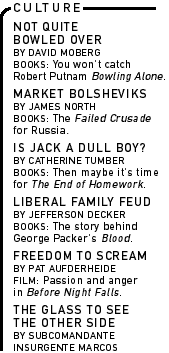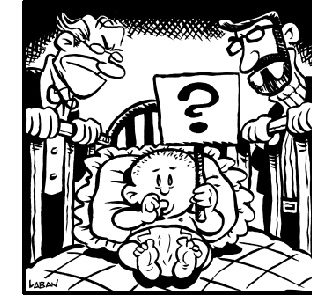 
|

|

|

|
| |
|
|
|
Blood of the Liberals George Packer's grandfather, George Huddleston, made a career as a lawyer and a congressman by defending debtors, miners and industrial workers in Birmingham, Alabama against the steel trust and Wall Street. Never popular with conservative Democrats (who tagged him the "Little Bolsheviki"), Huddleston nearly lost his seat in 1918 when Woodrow Wilson intervened on behalf of his primary opponent. So in 1935, other members were dumbfounded when Huddleston put his 20-year career in Washington on the line to fight Franklin Roosevelt on a piece of New Deal legislation called the Public Utility Holding Company Bill. One colleague chided Huddleston on the House floor for opposing the legislation, which gave the federal government more control over hydroelectric power. "The great liberal --yes, the radical of 1917," the member complained, was "closing his great career as the conservative gentleman from Birmingham." Huddleston shot back: "Men have called me a liberal. ... But always I have called myself a 'Democrat,' an old-fashioned, southern, Jeffersonian Democrat. ... My principles and myself remain unchanged--it's the definition of 'liberalism' which has been changed." The next year he lost the Democratic primary. Herbert Packer, the author's father, was a law professor who attracted political conflict.
These two sudden failures provide the pivotal moments in George Packer's three-generation family memoir, Blood of the Liberals. They also provide the book's narrative glue. In many ways, the father and grandfather couldn't have been less alike. Huddleston, the son of failed farmers from Tennessee, was Southern, traditional, largely self-educated. He headed up a large and noisy clan of Birmingham relatives, fought constantly with his hard-drinking wife, and once exchanged gunfire over a courtroom insult. Politically, he supported economic populism and (when pressed on the subject) defended Jim Crow. Herbert Packer, the son of Jewish immigrants in Connecticut, was Yale-educated, cosmopolitan, an intellectual. Reserved (to the point, his son suggests, of being repressed), he served in the Pacific during World War II and then pursued a mostly quiet life of academic study. Politically, he supported civil rights and government intervention to manage the economy, but he wasn't particularly interested in class politics. Huddleston's heroes were Jefferson and Jackson. Packer's were Wilson and FDR (both of whom had tried to end Huddleston's career). In the brief time they knew each other, there was no love lost between them. Yet they shared a family--Herbert Packer married Huddleston's daughter, Nancy--and a peculiar and unfortunate trajectory. For each represented, in his particular time and place, some idea of what it meant to be an American liberal--a reformer who hoped to promote freedom and equality, an essential part of the Democratic electoral coalition. Huddleston put his faith in an 18th-century notion of freedom, which elevated independent men against the rich and big business--and their presumed agent, the state. Accordingly, he was suspicious of the steel kings in Pittsburgh and the government in Washington. Packer defended the more modern notion that a just society means treating people the same way; he trusted an active, managerial state to protect civil liberties and root out racial discrimination. Each saw his brand of liberalism win some major accomplishments before creaking under the stress of new realities. For Huddleston, this happened in the '30s, when the New Dealers used the federal government to confront the grossest inequalities of industrial society--and he rejected them. For Packer, in the '60s, social movements on the left and (with more lasting political success) the right rebelled against the mid-century liberal consensus. George Packer's own story, which makes up the third part of the book, doesn't follow the same path. He comes of age in the '70s, in the wake of Vietnam and Watergate, and reaches political maturity during the Reagan and Gingrich revolutions--not exactly promising times for progressive politics. In his own experience, liberalism seemed to be in a state of intellectual disrepair, "a set of fixed positions that went along with a certain way of life peculiar to a narrow social class" rather than a positive agenda. The liberals he knew defended generous social welfare provisions but balked at fundamentally changing the structure of the economy; the protest politics he encountered emphasized ironic gestures, like public "die-ins," sometimes at the expense of rational persuasion or building electoral coalitions. Identity politics (when divorced from a universal language of equality) divided possible allies from one another and ceded too much rhetorical high ground to the right. Yet universal claims also seemed to lack force, or were too easily bent to fit social prejudices or maintain privileges of a certain elite: During the crisis over school integration in Boston in the '70s, the teen-age Packer asked his mother (who supported busing) whether she would let him be moved from his good Palo Alto public school to a struggling junior high across the tracks. She told him no, because "education meant more to us than people in South Boston." Dissatisfied with the political alternatives he is dealt, Packer goes looking for some new choices, within and outside of traditional liberal-Democratic politics. He volunteers in homeless shelters and travels to Africa with the Peace Corps. He joins the Boston chapter of Democratic Socialists of America. He follows a group of activists who mix faith and political organizing at new, interracial, evangelical churches that have sprung up in Birmingham between the fall of Jim Crow and the rise of the Christian right--several of which were involved in an effort to turn around a struggling housing project. And he celebrates Bill Clinton's election in 1992, which he hopes will mean the end of conservative dominance. But none are completely satisfactory: volunteerism seems dwarfed by massive social forces; the inspiration of faith undermined by its capacity to shame; the very word "socialism" a dead-end with almost all Americans; and Clinton a "a badly flawed vessel into which to pour such hope and meanings." He hasn't yet faced the singular, brutal defeat that stunned his grandfather and father--in part because he has never come close to a victory. A journalist and writer by trade (he previously penned a Peace Corps memoir and a couple of novels), Packer concentrates more on evoking people and places than on presenting an original historical argument about how or why things happened. For the most part, he avoids the temptation to over-generalize and turn the various characters into living embodiments of stock characters from political sociology (the Southern populist, the Adlai Stevenson liberal, etc.). And there's a pleasure meeting a family as obsessed with partisan politics as this one. Young George Packer names his new puppy Roosevelt and, at age seven, takes this first stab at an autobiography: "When I was five, Johnson was running for President against Goldwater. Johnson won. ... When I was seven, I voted for McCarthy." For their wedding, Nancy Huddleston and Herbert Packer write their vows in the form of "nominating speeches" and "platforms," in verse: We nominate Nancy to head the Liberals Goethe once complained that there "are no liberal ideas, only liberal sentiments," but George Packer thinks that's a good thing. "Few people," he writes, "reach a political opinion by deduction from an abstract system of philosophy; most feel their way into the opinions they hold, often contradictory ones, and are hardly aware of the forces within and without that drive them." This is true, so far as it goes. Family, history, religion, tradition and identity all pull at our political conscience, and help to determine how we vote, for whom we volunteer, where we speak out. The terms of a political debate can change overnight, good ideas can go bad--and in such cases it might be smarter to trust one's heart than to go for ideological consistency. For this reason, Packer criticizes a spate of recent books on political theory or electoral strategy that "approach liberalism's decline--or the left's, or democracy's, or America's--as a philosophical problem. ... Retool the basic structure, remix the ingredients, a little less individualism, a little more community, a little less race, a little more class, and you'll attract a majority." These days, he argues, the "deepest impediments [to social change] aren't intellectual but psychological, even existential." George Huddleston and Herbert Packer may not have agreed on many specific ideas, but they shared a faith in "collective self-betterment"--the idea that we might work together to improve the lot of all people--that is all-too-often missing from much of contemporary culture. This puts them both squarely in the liberal tradition. Yet in a book that chronicles so many shifts in the political landscape, so many disagreements among liberals and lefties and populists and reformers, this seems to tie the whole story together a little too neatly. For the issues that divided Huddleston and Packer are not completely regional or generational. They were also about the amount of trust each put in government, in organized citizens, in economic democracy, in the practical value of abstract concepts of justice--and to what degree each would shape policies and ideas. Those philosophical differences are real, and stubbornly persistent. After the Holding Company Bill passed, Roosevelt's brain trust
repaired to Joe Kennedy's Marwood estate to sip mint juleps and
compare sailing stories from college days. Reading Packer's description,
it's suddenly hard to know who to root for: the embittered old congressman
battling his own party over legislation that would help his constituents,
or the New Dealers gloating over the defeat of an independent-minded
Democrat. (One of them even pulled out a banjo and lead the group
in singing, "Old George Huddleston ain't what he uster be, ain't
what he uster be.") Blood of the Liberals describes dozens
of such conflicts, where two opposing positions might reasonably
lay claim to the true liberal principle. If Packer's broad view
of liberalism prevents him from choosing among them, it does make
him an engaging and personal chronicler of the dilemmas. Jefferson Decker is managing editor of Boston Review.
|


